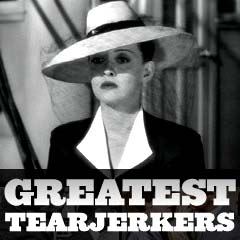|
The Greatest Tearjerkers of All-Time
|
|
Title Screen
|
Movie Title/Year and Brief Tearjerker Scene Description
|
Screenshots
|

|
Salaam Bombay! (1988, India)
- the wrenching drama of abandoned eleven-year-old Krishna
(real-life street rag-picker Shafiq Syed) who headed to the big city
of Bombay (with demands from his mother to not come home until he had
acquired 500 rupees to reimburse his brother for damaging his bicycle),
where he joined hordes of homeless urchin children and down-and-out
adults scrambling to survive the harsh streets
- the memorable heartbreaking
scene when Krishna hired a letter-writer to send a message back home,
only to realize that he didn't even know where his village was, or
what it might be called
- Krishna's (now called Chaipau - literally "tea
delivery boy") unrequited love for terrified, captive 16 year-old
Nepalese virgin "Sweet Sixteen" Sola Saal (Chanda Sharma)
who was being sold into prostitution in
the red-light district, and his awkward attempt
to set her free by lighting a fire
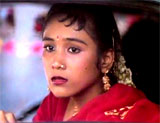
16 year-old Sola Saal
|
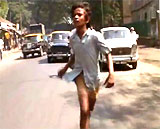
Krishna in Street
|
- the famous image
of Krishna running aimlessly down a Bombay street through traffic,
after escaping from detainment in a juvenile Indian prison
|
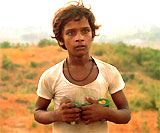
Abandoned 11 year-old Krishna
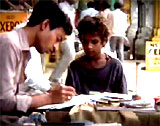
Letter-Writing Scene
|
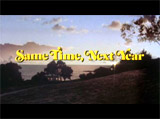
|
Same Time, Next Year (1978)
- the achingly poignant Marvin Hamlisch
score and title song: "The Last Time I Felt Like This" - sung
by Johnny Mathis and Jane Olivor
- the 1966 scene in which George Peters
(Alan Alda) wept profusely when he finally came to terms with the death
of his son Michael in Vietnam, during one of his annual extramarital
trysts with lover Doris (Ellen Burstyn), after he had admitted to
her: ("I can't seem to cry for him")
- George's proposal of marriage to Doris after 26
years of meeting sporadically, although she hesitated - she refused
because of a sense of duty to her unseen spouse Harry:
("I can't...I'm already married" and because "it's
a lot of things - affection, respect, and a sense of continuity.
I mean, we share all the same memories. It's comfortable").
He became angry with himself: ("Goddamn it. I was the one that
brought you back together six years ago. Why did I do such a stupid
thing? Why was I so generous?")
Then, she cautioned him: ("You might've been stuck with me for
good, and that idea scared you to death")
- the scene ended with
her assurance: ("I've always loved what I've seen") and
she offered him the best alternative to having her: ("You
can still have me once a year, same time, same place")

|
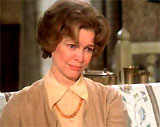
|
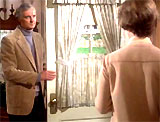
|
|
George's Rejected Marriage Proposal - and His Departure
|
- George gave
her an ultimatum: "Doris, I need a wife. I'm-I'm just not the
kind of man who can live alone. What I'm trying to say is, that without
you, I'll probably end up with Connie. Look, she knows all about us,
and, uh, she's not the kind of person who would go along with it. I
guess what I'm trying to say is that we'll never see each other again. Doris,
for God's sake, marry me"; when
rejected with a simple "I can't", he said he had to catch a plane and
he went out the door; she answered one final question about her favorite
movie stars before leaving: "Laurence Olivier, Marlon Brando, Cary
Grant and Lon McCallister"
- in the subsequent scene,
George unexpectedly and almost immediately returned by barging through
the front door, claiming that it was all a bluff - his request for
marriage was only due to desperation: ("OK,
I'm back, god-damn-it"); he found her lying on her bed crying;
he admitted that he was "desperate" because
Connie was "87 years old"
- in the tearjerking, crowd-pleasing
finale, he promised that they would continue to see each other once
a year until they grew old: "Look,
I wanted you to marry me and I figured if you thought somebody else
wanted me, I'd stand a better chance. Okay, maybe I didn't think
things through. I was desperate, okay? Look, I don't even wanna discuss
it. I'm back, and I'm gonna keep coming back every year until our
bones are too brittle to risk contact" - as they hugged and kissed
|
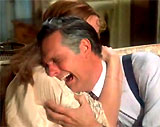
With Lover Doris, George Weeping at News of Death of Son

Doris Weeping on Her Bed
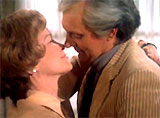
George's Return After Briefly Leaving
|
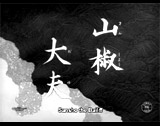
|
Sansho the Bailiff (1954, Jp.) (aka
Sanshô Dayû)
- Kenji Mizoguchi's very moving and sad drama was
about a family torn apart - it ended with the tearful
reunion of grown son Zushio (Yoshiaki
Hanayagi) with his hobbled, half-mad mother Tamaki (Kinuyo Tanaka)
(now aged, lame and blind, and with a shattered life), who had been seized
and forced into life as a prostitute on the island of Sado, now a
tsunami-devastated beach; they had been separated for twenty
years; her husband Masauji Taira (Masao Shimizu), and daughter Anju (Kyôko
Kagawa) had perished years earlier under cruel circumstances
- Zushio heard his mother's
singing - at first she didn't believe he was her son, and then was
saddened to hear when he revealed that both Anju and her husband
were dead: "It's
just you and I. We're all alone now" - he also claimed that he
had finally adopted his father's teachings: "I could have come
for you as a governor, but I gave up my title in order to follow Father's
teachings. Please, Mother, forgive me!" - she responded: "What
nonsense do you speak of? I don't know what you have done, but I know
that you followed your Father's teachings. And that is why we have
been able to meet again"
|
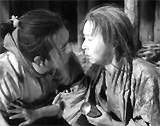
Reunion of Son Zushio with Mother Tamaki
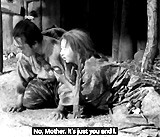
"It's just you and I"
|

|
Saving Private Ryan (1998)
- the poignant, sacrificial death
of badly-injured Capt. John Miller (Tom Hanks) when fatally shot
in the chest during battle. His final heroic, weakly-muttered, terse
words were a dying order to PFC James Ryan (Matt Damon) to 'earn'
the sacrifices that had saved him on the mission and
not let their dying efforts go to waste, so that he could go back to
his mother; then, his eyes
flickered and he ceased living: ("James... Earn this. Earn it.")
- in voice-over, a lengthy letter from General George
C. Marshall to Ryan's mother was read informing her that her sole
surviving, youngest son was alive and returning home from the European
battlefield: ("My dear Mrs. Ryan. It's with the most profound
sense of joy that I write to inform you your son, Private James Ryan,
is well and, at this very moment, on his way home from European battlefields.
Reports from the front indicate James did his duty in combat with
great courage and steadfast dedication, even after he was informed
of the tragic loss your family has suffered in this great campaign
to rid the world of tyranny and oppression. I take great pleasure
in joining the Secretary of War, the men and women of the United
States Army, and the citizens of a grateful nation in wishing you
good health and many years of happiness with James at your side.
Nothing, not even the safe return of a beloved son, can compensate
you, or the thousands of other American families, who have suffered
great loss in this tragic war. I might share with you some words
which have sustained me through long, dark nights of peril, loss,
and heartache. And I quote: 'I pray that our Heavenly Father
may assuage the anguish of your bereavement, and leave you only the
cherished memory of the loved and lost, and the solemn pride that
must be yours to have laid so costly a sacrifice upon the altar of
freedom.' -Abraham Lincoln. Yours very sincerely and respectfully,
George C. Marshall, General, Chief of Staff.")
- in voice-over, as a lengthy letter from General Marshall
was read to Ryan's mother,
Ryan's face transitionally dissolved or morphed into the face of
the nameless, elderly teary-eyed veteran (Harrison Young) - revealed
to be an older Ryan - visiting the Normandy cemetery at the film's
beginning (50 years later) - at the grave site of Captain Miller
- the older, teary-eyed Ryan asked his wife
for reassurance: ("Am I a good man? Tell me that I have been
a good man"),
and uncomprehendingly - she reassured him

|

|
|
Younger Ryan Morphed Into Older Ryan
|
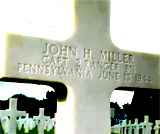
Miller's Normandy Gravesite
|

Billowing US Flag
|
- the final image was of a back-lit American flag billowing
in the wind
|

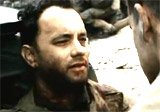
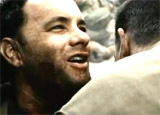
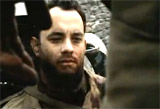
Miller to Ryan: "James... Earn this. Earn it"
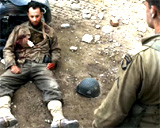
Death of Captain Miller
|

|
Schindler's List (1993)
- the upsetting, brutal scene of the
clearing and liquidation of the Krakow Ghetto, and the fate of a girl
in a drab red coat: still wearing
her coat, she was later spotted on a small cart with another corpse
- the exhumation and incineration
of the corpses in graves
- the labored compilation and typing of 'Schindler's
List' by Stern as Oskar Schindler (Liam Neeson) desperately paced
the room - including his accountant Itzhak Stern's (Ben Kingsley)
eloquent summation: "The
list is an absolute good. The list is life. All around its margins
lies the gulf"
- the arrival of a boxcar of female workers
at Auschwitz and the intense shower scene
- Schindler's final address to his workers following
the war, and his announcement of the unconditional surrender of Germany:
("The
unconditional surrender of Germany has just been announced. At midnight
tonight, the war is over. Tomorrow, you'll begin the process of looking
for survivors of your families. In most cases, you won't find them.
After six long years of murder, victims are being mourned throughout
the world. We've survived. Many of you have come up to me and thanked me.
Thank yourselves. Thank your fearless Stern, and others among you who
worried about you and faced death at every moment. (sighing)
I'm a member of the Nazi party. I'm a munitions manufacturer. I'm a
profiteer of slave labor. I am a criminal. At midnight, you'll be free
and I'll be hunted. I shall remain with you until five minutes after
midnight. After which time, and I hope you'll forgive me, I have
to flee. (To the Nazi guards) I know
you have received orders from our Commandant, which he has received
from his superiors, to dispose of the population of this camp.
Now would be the time to do it. Here they are, they're all here.
This is your opportunity. (murmuring) Or, you could leave,
and return to your families as men instead of murderers. (The
guards left) In memory
of the countless victims among your people, I ask us to observe
three minutes of silence")
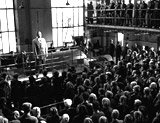
|
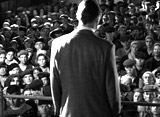
|
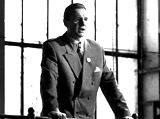
|
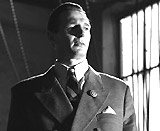
|
|
Schindler's Farewell to His Factory
Workers and Nazi Guards
|
- Oskar Schindler's heart-wrenching goodbye to his accountant Itzhak
Stern: ("I could've got more... I didn't do enough")
- the final coda (in color) pairing real-life survivors with their counterpart
actors/actresses as they placed rocks on the real-life grave of Schindler
|

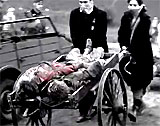
Corpse of Girl in Red Coat on Cart
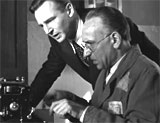

The Typing of 'Schindler's List'

Shower Execution Scene at Auschwitz

Stern: "I didn't do enough"

Film's Coda
|
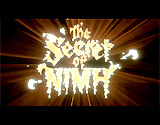
|
The Secret of NIMH (1982)
- the touching scene of tiny widowed field mouse Mrs.
Brisby (voice of Elizabeth Hartman) administering medicine to her
mortally-threatened pneumonia-inflicted son Timmy (voice of Ian Fried)
to the tune of Paul Williams' "Flying Dreams Lullaby";
she assured her other worried children: ("He's just very sick.
Mr. Ages called it pneumonia")

Timmy's Pneumonia
|

Mrs. Brisby: "He's just very sick"
|
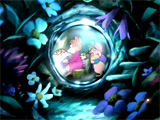
View From Outside Their Dwelling
|
- the scene in which Mrs. Brisby learned of her dead
husband's past - ominous scene of wise rat leader Nicodemus' (Derek
Jacobi) description of the National Institute of Mental Health's
(NIMH) laboratory: ("In
the beginning, we were ordinary street rats, stealing our daily bread,
and living off the efforts of man's work. We were captured, put in
cages, and sent to a place called NIMH. There were other animals
there, in cages. They were put through the most unspeakable tortures,
to satisfy some scientific curiosity. Often, at night, I would hear
them crying out in anguish. Twenty rats and eleven mice were given
injections. Our world began changing. Then, one night, I looked upon
the words under the cage door and understood them! We had become
intelligent. We could read. The miracle was kept secret from the
scientists, and in the quiet of the night, we escaped through the
ventilation system. The mice were blown away --- sucked down dark air-shafts
to their deaths. All, except two - Jonathan and Mr. Ages") - in short,
Nicodemus had explained how as a result of the NIMH experiments,
a group of rats known as "the Rats of NIMH" that lived in a rosebush
outside Farmer Fitzgibbons' house, were highly intelligent; they had
an extended life-span and a slowing of their aging process; rats that
had been through the treatments included Mrs. Brisby's husband Jonathan,
Nicodemus and Mr. Ages
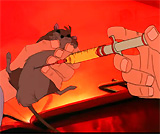
Rats and Mice Given Injections
|
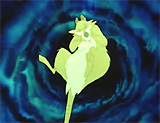
"Our world began changing"
|
|
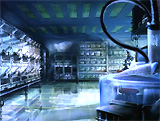
"A Place Called NIMH"
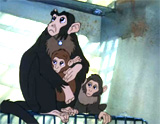
"Unspeakable Tortures"

"Often at night, I would hear them crying out in anguish"
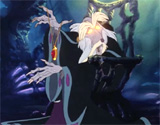
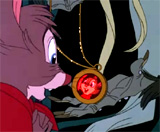
Nicodemus Presenting Mrs. Brisby with Magical Amulet
|
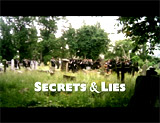
|
Secrets & Lies (1996, UK)
 #32
#32
- the climactic birthday BBQ scene (for a daughter)
in which hidden secrets, evasions and personal issues were finally
revealed between the members of a dysfunctional family:
- Cynthia Rose Purley (Brenda Blethyn), a frumpy,
disheveled, unmarried, middle-aged working class London mother, who worked
in a cardboard box factory
- Roxanne (Claire Rushbrook), Cynthia's bitter, sullen, abusive 21 year-old
street-sweeper daughter (illegitimate) who was celebrating her birthday
-
Hortense Cumberbatch (Marianne Jean-Baptiste), a successful, soft-spoken, compassionate,
well-to-do, and good-natured 27 year-old black, middle-class London optometrist;
Hortense had been given up for adoption
- in the shocking revelatory scene, Cynthia admitted
to her daughter Roxanne that one of the guests - Horstense -
was actually her half-sister ("She's
your sister!"); Cynthia was Hortense's long-lost biological
(or birth) mother (the child was fathered by a Jamaican boy, an American
medical student vacationing in Benidorm, when Cynthia was 15 years
old)
|
Roxanne's Birthday Party Scene
|
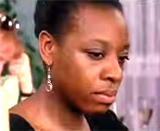
Hortense
|
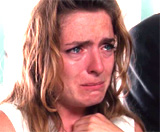
Roxanne
|
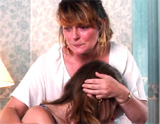
Cynthia Comforting Monica
|
- coming to his wife Monica Purley's (Phyllis Logan)
defense, Cynthia's silently suffering photographer and younger brother
Maurice Purley (Timothy Spall) delivered an angry speech about
all of the family's pains and secrets - including his revelation
that Cynthia's sister-in-law Monica was incapable of having children
- he urged everyone to 'share their pain' instead of harboring resentments:
("Secrets
and lies! We're all in pain! Why can't we share our pain? I've spent
my entire life trying to make people happy, and the three people
I love the most in the world hate each other's guts, and I'm in the
middle! I can't take it anymore!")
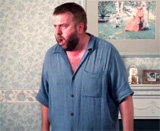
|

|
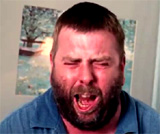
|
|
Maurice: "Secrets and lies! We're all in pain"
|
- the final
overhead shot of Cynthia, Roxanne and Hortense settling comfortably
in the backyard as a new family and having tea, and Cynthia's contented
last line: ("This
is the life, ain't it?")
|
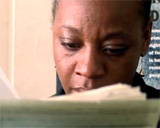
Hortense Tracking Down Her Birth Mother After Death of Her Adoptive Mother
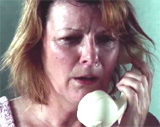
Hortense Contacting Cynthia - The Revelation That Cynthia
Was Hortense's Birth Mother
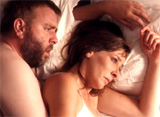
Maurice Struggling to Raise Family with Wife Monica
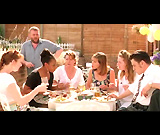
BBQ Birthday Party for Roxanne
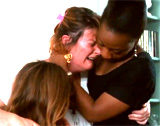
Reconciling

Overhead View of Group in Backyard
|

|
Sense & Sensibility (1995,
UK/US)
 #45 #45
- the sad scene in which spirited Marianne
Dashwood (Kate Winslet) discovered that "good-for-nothing" dashing
womanizer John Willoughby (Greg Wise) - the man she had fallen madly
in love with during a torrid affair - had sent her a "Dear John" letter;
he returned her letters and lock of hair, and announced his
engagement to a rich woman (Miss Grey reportedly with 50,000 pounds);
Marianne's sister Elinor Dashwood (Emma Thompson) commiserated with
her: "He's broken faith with all of us. He made us all believe
he loved you," after which Marianne collapsed inconsolable
- the scene of Marianne staring
at Willoughby's mansion estate during a heavy rainstorm - and her
trance-like recitation of William Shakespeare's 116th Sonnet: ("Love
is not love which alters when it alteration finds, or bends with
the remover to remove. Oh. no. It is an ever fixed mark that
looks on tempests and is never shaken") - leading
to her near-death of pneumonia
- in the film's conclusion set at Dashwood cottage,
the surprising and unexpected news from stepbrother-in-law bachelor
Edward Ferrars (Hugh Grant) to his shy love interest Elinor Dashwood
that he had released from engagement his greedy fiancee Lucy Steele
(Imogen Stubbs) - and that his brother Robert (Richard Lumsden) had
married her the previous week in Plymouth -- and Elinor's exultant,
near-hysterical half-laughing/half-crying response of happy tears
to the news that he was now available
- Edward's profession of love to an unsuspecting Elinor
(who began weeping with joy), explaining how he originally thought
they had only been friends: ("I
met Lucy when I was very young. Had I had an active profession, I
should never have felt such an idle and foolish inclination. My behavior
at Norland was very wrong, but I convinced myself that you felt only
friendship for me, and that it was my heart alone that I was risking.
I have come here with no expectations, only to express, now I am
at liberty to do so, that my heart is, and always will be yours")
- from
afar and up in her tree-house, young Margaret Dashwood (Emilie
François) reported
to Mrs. Dashwood (Gemma Jones) and Marianne down on the ground that
she was watching Edward propose to Elinor - the film's final words:
("He's
sitting next to her...he's kneeling down")
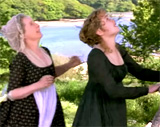
|
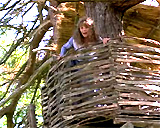
|
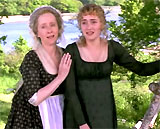
|
|
A View of the Proposal Reported From
Treehouse
|
- the joyous double-marriage of Elinor with Edward
and Marianne with the older, wiser Colonel Brandon (Alan Rickman),
as the Colonel tossed coins in the air for the witnesses
|
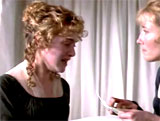
Marianne's Reaction to 'Dear John' Letter
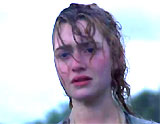
Marianne's Recitation of Shakespeare in the Rain
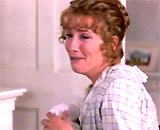
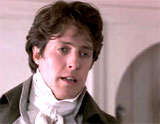
Edward's Return and Proposal to Elinor
|
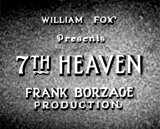
|
7th Heaven (1927) (aka Seventh Heaven)
- the film's opening title card referred to inspirational
goals in life: "For those who will climb it, there is a ladder leading
from the depths to the heights -- from the sewer to the stars --
the ladder of Courage"
- the introduction of street angel-waif
Diane (Janet Gaynor, Best Actress winner), a young prostitute who was
terrorized (whipped and almost strangled) in the street gutter by
her absinthe-addicted, tyrannical and abusive older sister Nana (Gladys
Brockwell); she was rescued from injury and Nana was scared off by lowly,
poor Parisian sewer worker Chico Robas (Charles Farrell), whose dreams
were to become a street cleaner-washer
|
Diane's Brutal Whipping and Strangulation by Nana
|

Nana (Gladys Brockwell) - Diane's Abusive Sister
|
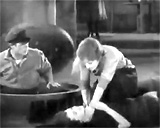
Diane Rescued From Nana's Brutality in the Street
by Chico
|
- a few moments later, Chico also prevented a
desperate Diane from committing suicide (by stabbing) by grabbing
his knife from her as she was about to kill herself by plunging the
knife into her heart - he reprimanded her: "With MY knife! I like
that!"
- Chico also rescued Diane shortly later from arrest
by the authorities, when he claimed that Diane was his wife (a bogus
marriage); however, he realized that his ambitions might be "ruined"
by the impulsive decision to offer his residence to her; Diane moved
in with Chico temporarily to keep up appearances (until the police
verified his story), so that she wouldn't be charged with vagrancy
- there was a marvelous tracking shot (with an elevator
crane) as Chico led Diane up the winding stairs to his 7th floor
bohemian loft ("Seventh
Heaven") for the first time; he bragged: "Not bad, eh? I work
in the sewer -- but I live near the stars!"
- although he warned: "After the police come, you go!",
he changed his mind and told Diane: " - if you want to stay - you're
not in my way"; love slowly blossomed between the couple although
he was shy and reticent about telling her he loved her: "I can't
say it! It's too silly", but he blurted out: "Chico - Diane - Heaven!"
with his arms outstretched; she kept repeating: "Say it again!"
- when the Great War broke out, Chico was finally and
at last able to admit that he loved Diane - knowing that he would
miss her; she confessed to him: "I'm not used to being happy ---
It's funny -- It hurts!"; he worried that they wouldn't have time
to be married, and then had an idea: "We will marry now - here!"
- and they performed a simple ceremony together by exchanging gold
necklaces and vows; fifteen minutes later, Chico was called to service
(to fight for France) and rushed to the train station - he gave Diane
one final glance before leaving: "- Let me fill my eyes with you!"
- during Chico's time away at the war front, Diane
worked in a munitions factory; she remained faithful to him - and
spiritually and telepathically communicated with him over many miles
through their hearts and minds, every morning at eleven
- when
she was notified with "bad news" that Corporal Chico had died (he
thought he was dying and sent her a message: "Tell her I died looking
up!") just before the Armistice was declared, she fainted
- and renounced her belief in God as a result - she told the priest:
"For four years I have called this Heaven - I prayed - I believed
in God -- I believed He would bring Chico back to me - And Chico
is dead! - I'm right back at the beginning again"
- however, the bittersweet climax revealed that Chico
had not died (but had been only wounded and blinded); as Diane was
denouncing God, he struggled through crowds celebrating the peace
in the streets to return home and climb the stairs, loudly calling
out her name! "DIANE!" - she couldn't believe that he had returned
alive - "They thought I was dead, but I'll never die!";
she sunk to her knees in disbelief; even though he was blind, he
affirmed: "My eyes are still filled with you"; she told him: "I will
be your eyes"
- they experienced a jubilant, almost
metaphysical reconciliation in an ethereal shaft of light
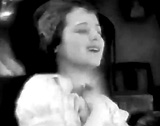
|
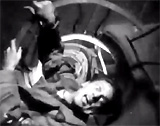
|
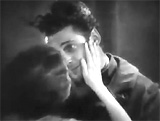
|
|
Distraught Over Chico's 'Death'
|
Chico Climbing the Stairs and Calling Out Diane's Name
|
Blind - But Together
|
|
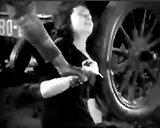
Chico Grabbing Diane's Hand To Prevent Her From Committing Suicide
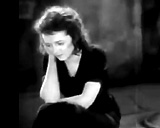
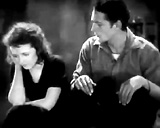
Diane - Distraught and Without Hope
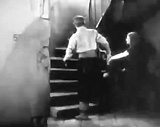
Tracking Shot Up 7 Flights of Stairs
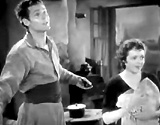
"Chico - Diane - Heaven!"
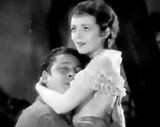
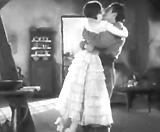
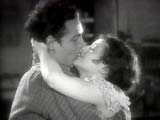
Chico Admitting His Love
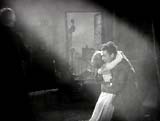
Chico and Diane Reconciled Together in the Light
|

|
Shadowlands (1993)
 #63
#63
- the unlikely romance between C. S. "Jack" Lewis
(Anthony Hopkins) and Jewish-American poet Joy Gresham (Debra Winger)
- including Joy's gauche first appearance in a British tea room:
("Anybody here called Lewis?")
- after a terrible diagnosis of terminal illness, Jack
realized that Joy didn't have much time to live, with death imminent
from advanced cancer (of the bone); Lewis proposed to Joy (and shortly
later married her) in her London hospital room: "Will
you marry this foolish, frightened old man, who needs you more than
he can bear to say, who loves you even though he hardly knows how?"
- the scene in which a teary-eyed C. S. "Jack" realized
that he was truly in love with dying, cancer-stricken Joy during
their first marriage of convenience after learning of her terminal
bone cancer: ("It's impossible. It's unthinkable.
How could Joy be my wife? I'd have to love her, wouldn't I? I'd have
to care more for her...than anyone else in this world. I'd have to
be suffering the torments of the damned. The prospect of losing her...")
- Jack's re-marriage to Joy
shortly before her death, this time for love
- after a kiss, and then after a period of sleep, she
admitted she was tired and about to die: ("I just don't wanna
leave you...Too much pain...You have to let me go...I've loved you
so") - and then just before she died,
he told her: "I love you, Joy. I love you so much. You made
me so happy. I didn't know I could be so happy. You're the truest
person I have ever known...Sweet Jesus. Be with my beloved wife,
Joy. Forgive me if I love her too much. Have mercy on us both."
- the scene of Joy's quiet death in bed with Jack's
last words offering assurance: ("Don't talk, my love. Just rest...just
rest" -
and after a kiss just before she died: "I love you, Joy. I love
you so much. You made me so happy. I didn't know I could be so happy.
You're the truest person I have ever known...")
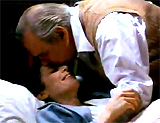
|
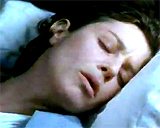
|

|
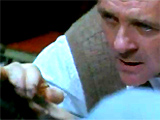
|
|
Joy's Quiet Deathbed Scene
|
- at Joy's memorial service,
the minister intoned: "We
therefore commit the body of thy servant, Joy to the elements:
Earth to earth, ashes to ashes, dust to dust." Lewis was told: "Thank
God for your faith, Jack. Only faith makes sense of times like
this. I know."
- following
Joy's death, Lewis was in shock, but remained stoic and resigned
to her death, although he was confused about the brutal fact of
human suffering and death: "I can't see
her anymore. I can't remember her face... I'm so afraid of never
seeing her again. Of thinking that suffering is just suffering
after all. No cause. No purpose. No pattern...There's nothing to
say. I know that now. I've just come up against a bit of experience,
Warnie. Experience is a brutal teacher. But you learn. My God,
you learn." He even questioned his own faith and God: "Just
don't tell me it's all for the best, that's all...God knows, but does
God care?... We're the creatures, aren't we? We're the rats in the cosmic
laboratory. I've no doubt the experiment is for our own good, but, uh,
it still makes God the vivisectionist, doesn't it?...It won't do. It's
this bloody awful mess, and that's all there is to it."
- Jack and Joy's young son Douglas (Joseph Mazzello)
sharing tortured grief and uncontrollable weeping in the attic:
Lewis: When my mother died, I was your age. I
thought that if I prayed for her to get better, and if I really
believed she'd get better, then she wouldn't die. But she did.
Douglas: It doesn't work.
Lewis: No, it doesn't work.
Douglas: I don't care.
Lewis: I loved your mother very much. Perhaps I loved her too much.
She knew that. She said to me, 'Is it worth it?' 'cause she knew
what it would be like later. Doesn't seem fair, does it?
Douglas: I don't see why she had to get sick.
Lewis: No, nor me. But, uh, you can't hold onto things, Douglas.
You have to let them go.
Douglas: Jack...Do you believe in heaven?
Lewis: Yes, I do.
Douglas: I don't believe in heaven.
Lewis: That's okay.
Douglas: I would like to see her again.
Lewis (sobbing): Me too.
|

Joy: "Anybody here called Lewis?"

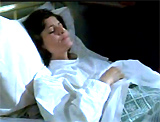
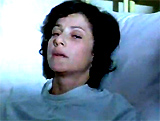
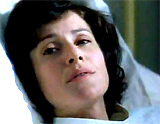
Advanced Cancer Diagnosis
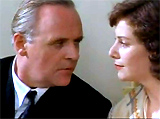
Getting Married in the Hospital
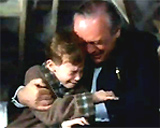
Jack and Joy's Young Son Douglas (Joseph Mazzello) Sharing
Grief
|
